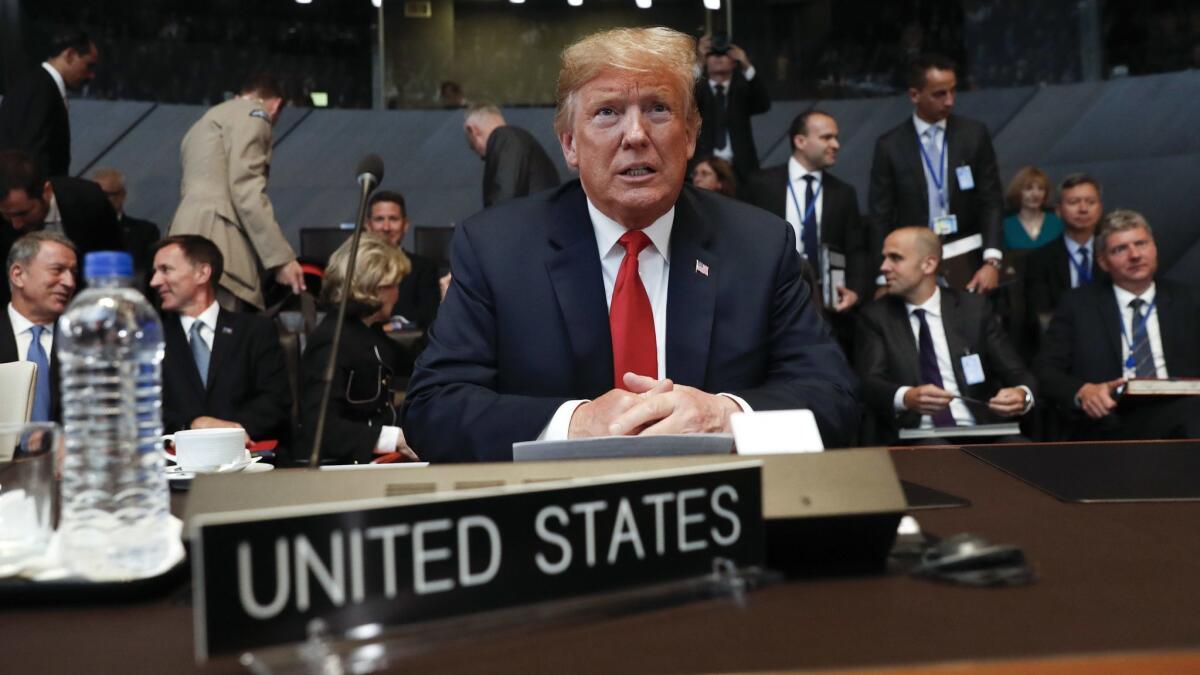Why is Trump going after small NATO ally Montenegro?

- Share via
President Trump never seemed to have much respect for the tiny European nation of Montenegro, the newest member of NATO.
At a summit at the transatlantic alliance’s headquarters in Brussels last year, Trump and other leaders were gathering for a group photograph when Trump shoved aside Dusko Markovic, the prime minister of Montenegro, in an attempt to get to the front.
For the record:
5:20 p.m. July 18, 2018An earlier version of this article mentioned a Fox News interview with Trump that aired Wednesday. The interview aired Tuesday.
Captured by television cameras, the shove went viral. It was the most international attention that Montenegro had received in years.
Now the nation of 622,000 people is back in the news.
During an interview with Trump that aired Tuesday, Fox News host Tucker Carlson asked him why the U.S. should abide by the rules of the North Atlantic Treaty Organization and defend Montenegro if it is attacked.
“Why should my son go to Montenegro to defend it from attack?” Carlson asked. “Why is that?”
“I understand what you’re saying,” Trump replied. “I’ve asked the same question.”
“Montenegro is a tiny country with very strong people … they have aggressive people. They may get aggressive, and congratulations, you’re in World War III.”
NATO’s most important tenet, Article 5, leaves little room for interpretation: “The Parties agree that an armed attack against one or more of them in Europe or North America shall be considered an attack against them all.”
This clause was applied for the first and only time after the U.S. was attacked on Sept. 11, 2001, and NATO countries came to the aid of their ally and deployed troops to Afghanistan. Montenegro, which joined the alliance last year, has since sent troops to that continuing war.
Trump’s comments were less about Montenegro than about his long-held criticism that the other 28 member countries are not spending enough on defense and that smaller countries in the alliance are getting a free ride because their military capacity is negligible compared with that of the big players.
Such complaints about NATO are not unfounded. Past presidents and officials have also argued that Europeans should be contributing more to defense.
But Article 5 has been sacrosanct since NATO’s creation in 1949 to ward off aggression from the Soviet Union.
Even floating the idea that the United States would not help a fellow member facing aggression goes against nearly seven decades of U.S. foreign policy.
Trump has wavered on his commitment to the alliance. On the campaign trail he called NATO “obsolete.” Last year during a news conference with the president of Romania, he pledged his commitment to Article 5.
Then last week he stirred havoc at the annual NATO summit when he said the U.S. might leave the alliance if other members didn’t pay more.
Asked about Trump’s comments about Montenegro, State Department spokeswoman Heather Nauert would say only that the U.S. continues to maintain an “ironclad commitment” to mutual defense under NATO.
Jim Dobbins, a senior fellow at the Rand Corp., said Trump’s position reflects how the president is a bilateralist — he prefers to conduct foreign relations country by country rather than through groups such as the United Nations or the World Trade Organization.
“Trump feels the United States will be in a stronger position if it deals with countries one by one,” Dobbins said.
“He feels we are taking on too many defense commitments. Although why he would start with NATO is puzzling. This is the first commitment the U.S. ever took on in an enduring basis.”
Dobbins also pointed out that Trump’s comments on Montenegro and NATO put him squarely in agreement with Russia. Congress largely views Russia as a foe of the U.S., but Trump has argued it could be a potential ally on some issues and has sought to cultivate a relationship with its president, Vladimir Putin.
“Russians were unhappy when Montenegro joined NATO,” Dobbins said. “Russia has criticized NATO and said it’s unnecessary, outdated and a legacy of the Cold War.”
In 2016, Russia was accused of trying to stage a coup in Montenegro in order to replace its government with one that was pro-Kremlin.
Richard Anderson, a political scientist at UCLA, said Montenegro’s vulnerability to Russian aggression illustrates the importance of including smaller countries in NATO.
“Montenegro has a coastline so Russians have a way to get to them,” Anderson said. “But what makes them vulnerable is that they are next to Serbia” — a Russian ally.
Montenegro — which also borders Croatia, Bosnia-Herzegovina, Albania and Kosovo — was part of Yugoslavia until it broke up and formed a republic with Serbia in 2003. Three years later the country declared its independence.
Trumps comments about Montenegro was met with pushback.
On Wednesday, Sen. John McCain (R-Ariz.) wrote on Twitter, “By attacking Montenegro & questioning our obligations under NATO, the President is playing right into Putin’s hands.”
“The people of #Montenegro boldly withstood pressure from #Putin’s Russia to embrace democracy,” he tweeted.
By coincidence, Trump’s comments came as the Republican governor of Maine, Paul LePage, was meeting with political officials in Montenegro in an effort to promote trade and friendship.
The U.S. Embassy in the capital, Podgorica, even posted an interview with LePage.
He said that “while there has been difficulty in the Balkans for many many years, … everybody likes Montenegro.”
Follow me on Twitter @melissaetehad
More to Read
Sign up for Essential California
The most important California stories and recommendations in your inbox every morning.
You may occasionally receive promotional content from the Los Angeles Times.














